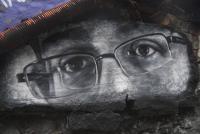-
Revelations about U.K. special forces in Syria require debate on U.K. role: MPs
British MPs say that the Ministry of Defense’s refusal to comment on ground operations by Special Forces in Syria means it is not possible to hold an informed debate about U.K. role in Syria. The Times reported that elite U.K. soldiers had crossed into southern Syria to support opposition forces fighting ISIS militants close to the border with Jordan.
-
-
Last surviving 9/11 search-and-rescue dog dies, receives hero's send-off
The last surviving search and rescue dog who worked at Ground Zero following the 9/11 terrorist attacks died on Monday. Bretagne, a 16-year-old golden retriever, was put down at Fairfield Animal Hospital in Cypress, Texas. As Bretagne slowly walked into the hospital, she was saluted by representatives of state agencies who came to pay their respects.
-
-
Captured Hamas operative: Terror tunnel network extends across Gaza
Hamas fighters can travel underground throughout the entirety of the Gaza Strip using the terror group’s tunnel network, according to a Hamas operative who was captured last month after he crossed illegally into Israel from Gaza. Palestinians in Gaza have recently expressed fears that Hamas tunnels built in or near civilian areas are putting non-combatants at risk of being hurt by Israeli strikes.
-
-
Revisiting the relationship between hate crime and terrorism
New research from START examines the link between hate crime (bias-motivated crime) and terrorism at the county level, focusing on far-right extremism in the United States and pulling data from the U.S. Extremist Crime Database (ECDB) and the Global Terrorism Database (GTD). Among other things, the research has found that counties experiencing increases in one type of bias-motivated or extremist violence are likely to see significant increases in other types of extremist activity.
-
-
Three Somali Americans convicted for planning to join ISIS in Syria
In a landmark federal court case in Minnesota, three young Somali American men who planned to join ISIS in Syria, have been convicted of conspiracy to commit murder overseas. Each could face life in prison after they were convicted of the most serious charges. In all, the federal government has indicted ten Somali American men in relation to the conspiracy, which was uncovered by a sprawling FBI counterterrorism investigation.
-
-
Euro 2016 security fears heightened as Frenchman arrested in Ukraine
The Euro 2016, the European soccer championship tournament, opens this coming Friday amid growing security concerns. The Ukrainian security agency, the SBU, announced over the weekend that it had arrested a Frenchman who had in his possession a massive arsenal of weapons he had purchased in the Ukraine. The French media report that he was apparently not planning to target any Euro 2016 events. Rather, his idea was to attack other targets, exploiting the fact that thousands of security personnel would be diverted from their usual routines.
-
-
Inside ISIS' looted antiquities trade
For excavators – archaeologists, but also looters like the Islamic State, or ISIS – the opportunity for discovery in modern Iraq and Syria is dazzling. Everyone seems to agree that ISIS is digging up and selling archaeological artifacts to make money. But no one seems to agree on how much money it’s actually making from its illegal antiquities trade: amounts have ranged from $4 million to $7 billion. Patchy data and methodological challenges do not fully explain why $7 billion fell to $4 million in public discussions about the ISIS antiquities trade. While market mystique and over-the-top plot lines are fine for Hollywood films and adventure novels, it’s no way to understand terrorist finance, and without that understanding we are unlikely to arrive at genuine and lasting solutions.
-
-
Iran still leading terrorism-sponsoring state: U.S.
Last Thursday the Department of State released the 2015 Country Reports on Terrorism. The report is provided to Congress each year and covers developments in countries in which acts of terrorism occurred, countries which are state sponsors of terrorism, and countries determined by the Secretary to be of particular national security interest.
-
-
U.S. adversaries use measures short of war to advance their strategic goals
Since the terrorist attacks of 9/11, Russia, China, and Iran have successfully exploited or stretched U.S. thresholds for war in order to further their strategic goals and undermine U.S. interests. The United States will have to address the problems of foreign intervention and threats short of war if it is to prevent further erosion of its global influence by its competitors, RAND researchers say.
-
-
Kurdish forces fight to retake Syria's “Little London”
Defense Secretary Ashton Carter on Thursday said that ISIS fighters have used the northern Syrian city of Manbij as a base to plan attacks against the West. U.S. Special Forces have joined Kurdish fighters in surrounding the militants’ stronghold. Manbij has earned the name “Little London” because of the many Britons who have made it their homes after joining ISIS.
-
-
Britain’s exit from the EU would necessitate review of British defense posture: Expert
A new report states that a U.K. decision to leave the EU would be as significant a shift in U.K. national strategy, as the decision in the late 1960s to withdraw from bases East of Suez and,. As a result, the decision to leave the EU would necessitate a new Strategic Defense and Security Review (SDSR).
-
-
Terrorist or criminal? New software uses face analysis to find out

Pulling a poker face means betraying no visible emotion, so that opponents cannot tell what you are really thinking. But a Tel Aviv startup’s face-profiling technology recently proved fairly accurate at predicting which four players were most likely to beat out forty-six other contenders in an amateur poker tournament. The company say that its technology, which analyzes faces shown in photos and videos and classifies them according to fifteen parameters predictive of personality traits and types, can help identify terrorists.
-
-
Nigeria has failed to stamp out Boko Haram in Buhari’s first year in power

When Muhammadu Buhari — a former general and, for a year-and-a-half in the early 1980s, the military ruler of Ngeria — was sworn in as Nigeria’s president on 29 May 2015, he promised to “stamp out” Boko Haram within twelve months. Security analysts note that despite some progress, he has failed to do so. Critics of Buhari say that while Boko Haram has been pushed back and has lost large swaths of territory it used to control, Buhari’s heavy-handed approach to unrest or dissent of any kind in Nigeria has created more problems.
-
-
Snowden performed “public service” but should be punished: Eric Holder

Eric Holder, the former U.S. Attorney General, has said Edward Snowden performed a “public service” by triggering a debate over surveillance techniques. Holder added, however, that he believed Snowden should be punished for leaking classified intelligence information which threatened U.S. national security.
-
-
Congress restores funds to NYC counterterrorism program

Senator Charles Schumer (D-New York) said on Thursday that Congress is set to approve a Homeland Security budget which would restore $600 million in anti-terror funding. The White House had proposed a budget with cuts to the anti-terror program. The proposed cuts involve reduction of the Urban Area Security Initiative (UASI), which would be funded at $330 million for fiscal year 2017, after being funded at $600 million in 2016.
-
More headlines
The long view
Factories First: Winning the Drone War Before It Starts
Wars are won by factories before they are won on the battlefield,Martin C. Feldmann writes, noting that the United States lacks the manufacturing depth for the coming drone age. Rectifying this situation “will take far more than procurement tweaks,” Feldmann writes. “It demands a national-level, wartime-scale industrial mobilization.”
No Nation Is an Island: The Dangers of Modern U.S. Isolationism
The resurgence of isolationist sentiment in American politics is understandable but misguided. While the desire to refocus on domestic renewal is justified, retreating from the world will not bring the security, prosperity, or sovereignty that its proponents promise. On the contrary, it invites instability, diminishes U.S. influence, and erodes the democratic order the U.S. helped forge.
Fragmented by Design: USAID’s Dismantling and the Future of American Foreign Aid
The Trump administration launched an aggressive restructuring of U.S. foreign aid, effectively dismantling the United States Agency for International Development (USAID). The humanitarian and geopolitical fallout of the demise of USAID includes shuttered clinics, destroyed food aid, and China’s growing influence in the global south. This new era of American soft power will determine how, and whether, the U.S. continues to lead in global development.
Water Wars: A Historic Agreement Between Mexico and US Is Ramping Up Border Tension
By Natasha Lindstaedt
As climate change drives rising temperatures and changes in rainfall, Mexico and the US are in the middle of a conflict over water, putting an additional strain on their relationship. Partly due to constant droughts, Mexico has struggled to maintain its water deliveries for much of the last 25 years, deliveries to which it is obligated by a 1944 water-sharing agreement between the two countries.
How Disastrous Was the Trump-Putin Meeting?
In Alaska, Trump got played by Putin. Therefore, Steven Pifer writes, the European leaders and Zelensky have to “diplomatically offer suggestions to walk Trump back from a position that he does not appear to understand would be bad for Ukraine, bad for Europe, and bad for American interests. And they have to do so without setting off an explosion that could disrupt U.S.-Ukrainian and U.S.-European relations—all to the delight of Putin and the Kremlin.”
How Male Grievance Fuels Radicalization and Extremist Violence
By Haily Tran
Social extremism is evolving in reach and form. While traditional racial supremacy ideologies remain, contemporary movements are now often fueled by something more personal and emotionally resonant: male grievance.
